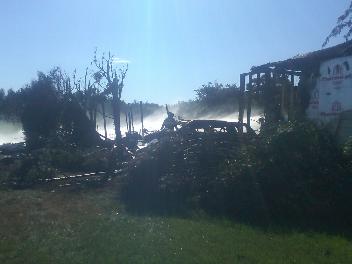by Liz Childers

Yesterday morning, an explosion destroyed much of Roy and Doris Bannister’s home in Orleans County, New York.
Investigators report that around 7 am, Bannister heard an alarm going off in the carport area. When the homeowner entered, the travel trailer, which was parked inside, exploded.
Bannister’s family rescued him from beneath a pile of rubble. Last night, he was in guarded condition at in the Burn Ward at Strong Memorial Hospital in Rochester. An EMT at the scene said about 40 percent of Bannister’s body was burned, but he was lucid and speaking with responders.
The trailer and carport were completely destroyed in the explosion; the house sustained damage from the resulting fire. Mrs. Bannister was not injured.
Investigators believe the travel trailer’s leaking propane tank caused the explosion.
While this is a frightening situation, it is also a reminder that propane can be dangerous. As most RVers use propane for refrigeration, heat, or cooking, propane safety is an issue. Campers who fuel their stoves with propane should also know proper storage guidelines. If you fall under either of those categories, make sure you follow these propane safety tips.
Store Your Tanks Properly
Propane tanks should be stored outdoors on a firm surface that will not collect water – ideally a concrete slab. Position the tanks upright. Consider purchasing a UV resistant, waterproof cover for the tanks. These will help prevent any rusting or overheating.
Have Your Tanks and RV Inspected Annually
Schedule an annual inspection with an RV dealer of licensed propane distributor. A certified technician will check for leaks, weakened valves, and proper pressure setting and make sure there are no rusty spots or dents that are damaging the tank. Ask the technician to also check the supply lines on all propane-operated appliances in your RV. He will need to make sure you are using the right size line and that the lines are positioned safely.
Buy a Gas Detector
A simple gas detector can save you and your family’s lives. Mount one in your RV and, if you keep your trailer in a garage or carport, mount another there. Test it regularly to ensure that it is still working.
What to Do If You Suspect a Leak
If your gas detector alarm goes off or if you smell gas, get everyone out of the RV immediately and shut off the supply valve on the propane tank. Do not use any appliances or flip any switches, as both of these actions could ignite the gas. Leave the door of the trailer open to allow it to air out.
Know the Symptoms of Carbon Monoxide Poisoning
Once everyone is out of the trailer, check to see if anyone shows symptoms of carbon monoxide poisoning. These can be headaches, dizziness, nausea, confusion, and chest pain.



